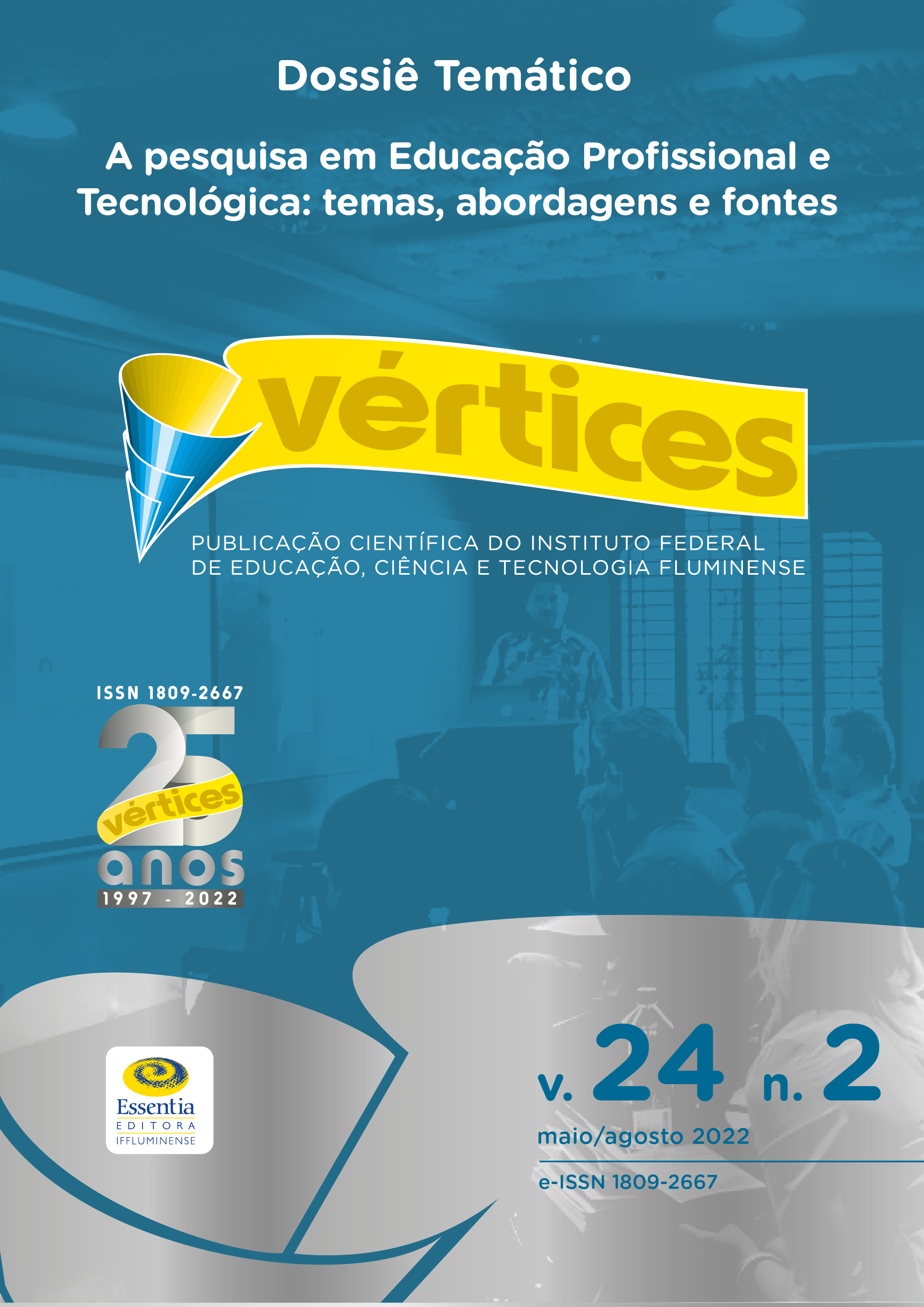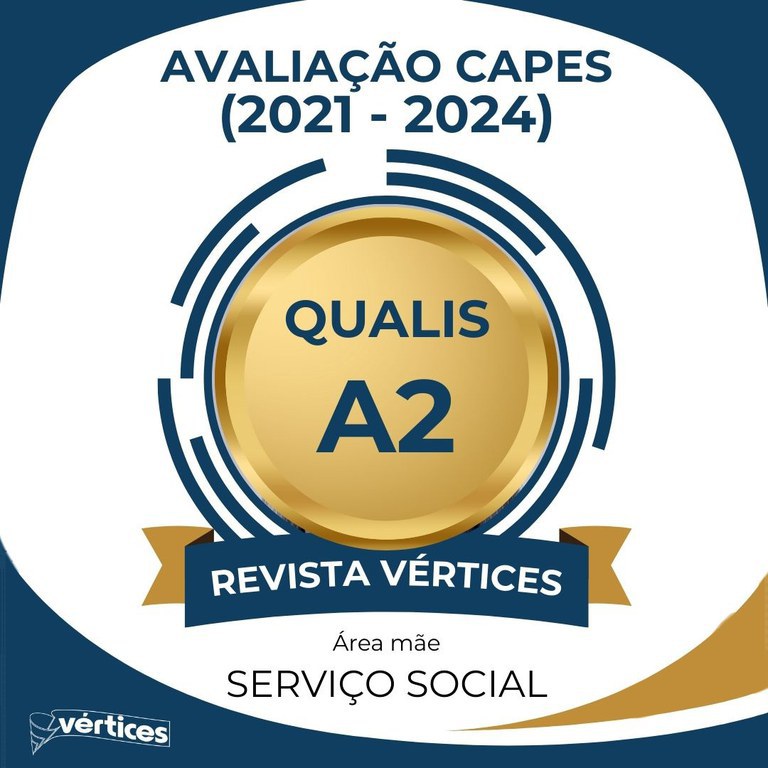Professional Training for the World of Work: the role of federal institutes
DOI:
https://doi.org/10.19180/1809-2667.v24n22022p281-294Keywords:
Federal Institutes, Professional Education (TVET), World of WorkAbstract
The present article has as its theme the role of the Federal Institutes (IF) of Education in professional training for the world of work. It aims to understand this role, as well as the importance the IF have for the society. Bibliographic and documentary research allows a historical review of the vocational education trajectory in Brazil, relating it to different contexts, as well as to the dominant social projects of each period. The institution of the Federal Network of Professional, Scientific and Technological Education, creating the Federal Institutes of Education, Science and Technology, in 2008, the description of the objectives and pillars that structure their actions are also presented in this work. The analysis of the results indicates that the expansion of Industry 4.0 and the transformations experienced in the pandemic period give the IF even greater relevance in terms of integral, human and emancipatory professional training. This will contribute to the re-signification of the world of work, the relationships that are established in and society as a whole.Downloads
References
AIRES, R. W. A.; MOREIRA, F.K.; FREIRE, P. S. Indústria 4.0: competências requeridas aos profissionais da quarta revolução industrial. In: CONGRESSO INTERNACIONAL DE CONHECIMENTO E INOVAÇÃO, CIKI, 2017. Anais […]. Disponível em: https://proceeding.ciki.ufsc.br/index.php/ciki/article/view/314. Acesso em: 23 maio 2022.
ANJOS, M. B. Educação profissional e tecnológica: a prática pedagógica como veículo da liberdade. Humanidades e Inovação, v. 8, n. 53, 2021. Disponível em: https://revista.unitins.br/index.php/humanidadeseinovacao/article/view/5957. Acesso em: 22 maio 2022.
BATISTA, B. N. Sobre a Educação Profissional e Tecnológica no Brasil: do espírito emancipatório aos riscos da vampirização neoliberal. Debates em Educação, v. 11, n. 24, p. 523-545, 2019. Disponível em: https://www.seer.ufal.br/index.php/debateseducacao/article/view/6461. Acesso em: 23 maio 2022.
BECKER, T.; STERN, H. Future trends in human work area design for cyber-physical production systems. In: PROCEDIA CIRP, 57., 2016. DOI: https://doi.org/10.1016/j.procir.2016.11.070. Disponível em: https://www.sciencedirect.com/science/article/pii/S2212827116312240. Acesso em: ago. 2022.
BRASIL. [Constituição (1988)]. Constituição dos Estados Unidos do Brasil. Disponível em: http://www.planalto.gov.br/ccivil_03/constituicao/constituicao37.htm. Acesso em: 22 maio 2022.
BRASIL. Decreto nº 5.241, de 27 de agosto de 1927. Disponível em: https://www2.camara.leg.br/legin/fed/decret/1920-1929/decreto-5241-22-agosto-1927-563163-publicacaooriginal-87295-pl.html#:~:text=Paragrapho%20unico.Ar. Acesso em: 17 maio 2022.
BRASIL. Decreto nº 7.566, de 1909. Disponível em: https://www2.camara.leg.br/legin/fed/decret/1900-1909/decreto-7566-23-setembro-1909-525411-publicacaooriginal-1-pe.html. Acesso em: 15 maio 2022.
BRASIL. Decreto-Lei no 4.048, de 22 de janeiro de 1942. Disponível em http://www.planalto.gov.br/ccivil_03/decreto-lei/1937-1946/del4048.htm. Acesso em: 22 maio 2022.
BRASIL. Decreto-Lei nº 4.073, de 30 de janeiro de 1942. Disponível em: https://www2.camara.leg.br/legin/fed/declei/1940-1949/decreto-lei-4073-30-janeiro-1942-414503-publicacaooriginal-1-pe.html. Acesso em: 17 maio 2022.
BRASIL. Decreto-Lei no 8.621, de 10 de janeiro de 1946. Disponível em: http://www.planalto.gov.br/ccivil_03/decreto-lei/1937-1946/del8621.htm. Acesso em: 22 maio 2022.
BRASIL. Decreto-Lei Nº 9.613, de 20 de agosto de 1946. Disponível em: http://www.planalto.gov.br/ccivil_03/decreto-lei/1937-1946/del9613.htm. Acesso em: 22 maio 2022.
BRASIL. Instituto Nacional de Estudos e Pesquisas Educacionais Anísio Teixeira. Censo da Educação Superior. Brasília: Instituto Nacional de Estudos e Pesquisas Educacionais, 2021. Disponível em: https://www.gov.br/inep/pt-br/acesso-a-informacao/dados-abertos/indicadores-educacionais/taxas-de-rendimento. Acesso em: 22 maio 2022.
BRASIL. Lei nº 378, de 13 de janeiro de 1937. Dá nova organização ao Ministério da Educação e Saúde Pública. Disponível em: https://www2.camara.leg.br/legin/fed/lei/1930-1939/lei-378-13-janeiro-1937-398059-publicacaooriginal-1-pl.html. Acesso em: 17 maio 2022.
BRASIL. Lei no 3.552, de 16 de fevereiro de 1959. Dispõe sobre nova organização escolar e administrativa dos estabelecimentos de ensino industrial do Ministério da Educação e Cultura, e dá outras providências. Disponível em: http://www.planalto.gov.br/ccivil_03/leis/l3552.htm#:~:text=LEI%20No%203.552%2C%20DE%2016%20DE%20FEVEREIRO%20DE%201959.&text=Disp%C3%B5e%20sobre%20nova%20organiza%C3%A7%C3%A3o%20escolar,Cultura%2C%20e%20d%C3%A1%20outras%20provid%C3%AAncias. Acesso em: 22 maio 2022.
BRASIL. Lei nº 4.024, de 20 de dezembro de 1961. Fixa as Diretrizes e Bases da Educação Nacional. Disponível em: http://www.planalto.gov.br/ccivil_03/leis/l4024.htm. Acesso em: 22 maio 2022.
BRASIL. Lei no 6.545, de 30 de junho de 1978. Dispõe sobre a transformação das Escolas Técnicas Federais de Minas Gerais, do Paraná e Celso Suckow da Fonseca em Centros Federais de Educação Tecnológica e dá outras providências. Disponível em: http://www.planalto.gov.br/ccivil_03/leis/l6545.htm. Acesso em: 22 maio 2022.
BRASIL. Lei no 8.948, de 8 de dezembro de 1994. Dispõe sobre a instituição do Sistema Nacional de Educação Tecnológica e dá outras providências. Disponível em: http://www.planalto.gov.br/ccivil_03/leis/l8948.htm. Acesso em: 22 maio 2022.
BRASIL. Lei nº 9.394, de 20 de dezembro de 1996. Estabelece as diretrizes e bases da educação nacional. Disponível em: http://www.planalto.gov.br/ccivil_03/leis/l9394.htm. Acesso em: 22 maio 2022.
BRASIL. Lei nº 11.741, de 16 de julho de 2008. Altera dispositivos da Lei no 9.394, de 20 de dezembro de 1996, que estabelece as diretrizes e bases da educação nacional, para redimensionar, institucionalizar e integrar as ações da educação profissional técnica de nível médio, da educação de jovens e adultos e da educação profissional e tecnológica. Disponível em: http://www.planalto.gov.br/ccivil_03/_Ato2007-2010/2008/Lei/L11741.htm#art2. Acesso em: 22 maio 2022.
BRASIL. Lei n. 11.892, de 29 de dezembro de 2008. Institui a Rede Federal de Educação Profissional, Científica e Tecnológica, cria os Institutos Federais de Educação, Ciência e Tecnologia, e dá outras providências. 2008. Disponível em: http://www.planalto.gov.br/ccivil_03/_ato2007-2010/2008/lei/l11892.htm. Acesso em: 22 maio 2022.
BRASIL. Ministério da Educação. Histórico da Educação Profissional e Tecnológica no Brasil. Disponível em: http://portal.mec.gov.br/publicacoes-para-professores/30000-uncategorised/68731-historico-da-educacao-profissional-e-tecnologica-no-brasil. Acesso em: 15 maio 2022.
BRASIL. Ministério da Saúde. O que é uma pandemia? Fundação Oswaldo Cruz, 2021. Disponível em: https://www.bio.fiocruz.br/index.php/br/noticias/1763-o-que-e-uma-pandemia#. Acesso em: 15 maio 2022.
BRASIL. Ministério da Saúde. Secretaria de Gestão do Trabalho e da Educação na Saúde. Universidade Aberta do Sistema Único de Saúde. Política de acesso aberto do sistema UNA-SUS. Brasília: UNA-SUS, 2014. Disponível em: unasus.gov.br. Acesso em: 22 maio 2022.
CARNEIRO, M. A. LDB fácil: leitura crítico-compreensiva, artigo a artigo. 24. ed. rev., atual. e ampl. Petrópolis, RJ: Vozes, 2018.
CRUZ, J. A. S.; BIZELLI, J. L.; BIZELLI, T. V. Perspectivas sobre o isolamento social e a pandemia no ensino superior. Revista@mbienteeducação, v. 14, n. 2, p. 291-302, 2021. Disponível em: https://publicacoes.unicid.edu.br/index.php/ambienteeducacao/article/view/1123. Acesso em: 22 maio 2022.
DOMBROWSKI, U.; WAGNER, T. Mental strain as field of action in the 4th industrial revolution. In: PROCEDIA CIRP, 17, 2014. Proceedings […]. New York: Elsevier, 2014. DOI: https://doi.org/10.1016/j.procir.2014.01.077. Disponível em: https://www.sciencedirect.com/science/article/pii/S221282711400328X. Acesso em: 25 ago. 2022.
GORECKY, D. et al. Human-machine-interaction in the industry 4.0 era. In: IEEE INTERNACIONAL CONFERENCE ON INDUSTRY INFORMATICS, 12., 2014. Disponível em: https://ieeexplore.ieee.org/abstract/document/6945523. Acesso em: 25 ago. 2022.
FRIGOTTO, G. Educação e Trabalho: bases para debater a Educação Profissional Emancipadora. Perspectiva, Florianópolis, v. 19, n. 1, p. 71, 2001. Disponível em: https://periodicos.ufsc.br/index.php/perspectiva/article/view/8463. Acesso em: 15 maio 2022.
FRIGOTTO, G. Formação Profissional e Tecnológica para um mundo pós-pandemia. In: ENCONTRO DE FORMAÇÃO CONTINUADA INTERCAMPI. 2., 2021, Canal Instituto Federal do Maranhão, Campus Açailândia. Disponível em: https://www.youtube.com/watch?v=4dkBD6T2bZo. Acesso em: 15 maio 2022.
GUIMARÃES, N. C. O. Pressupostos para o ensino da Indústria 4.0 no ensino médio integrado à educação profissional: formação para a autonomia e emancipação. 2020. 254 f. Dissertação (Mestrado Profissional em Educação Profissional e Tecnológica) Instituto Federal do Rio Grande do Sul. Porto Alegre, 2020. Disponível em: https://dspace.ifrs.edu.br/handle/123456789/189. Acesso em: 23 maio 2022.
IBGE. Instituto Brasileiro de Geografia e Estatísticas. Painel de indicadores. Disponível em: https://www.ibge.gov.br/indicadores.html?view=default. Acesso em: 21 maio 2022.
MOURA, D. H. Educação Básica e Educação Profissional e Tecnológica: Dualidade Histórica e Perspectivas De Integração. HOLOS, v. 2, p. 4-30, 2007. Disponível em: https://www.redalyc.org/articulo.oa?id=481549273001. Acesso em: 25 ago. 2022.
NOSELLA, P.; AZEVEDO, M. L. N. A educação em Gramsci. Teoria e Prática da Educação, v. 15, p. 25-33, 2012. Disponível em: https://periodicos.uem.br/ojs/index.php/TeorPratEduc/article/view/20180. Acesso em: 22 maio 2022.
OLIVEIRA, T. F. Ensino médio integrado: uma necessidade possível para a educação pós pandemia. HOLOS, v. 4, p. 1-19, 2021. Disponível em: https://www2.ifrn.edu.br/ojs/index.php/HOLOS/article/view/11649. Acesso em: 15 maio 2022.
PACHECO, E. Desvendando os Institutos Federais: identidade e objetivos. Educação Profissional e Tecnológica em Revista, v. 4, n. 1, p. 4-22, 2020. DOI: 10.36524/profept.v4i1.575. Disponível em: https://ojs.ifes.edu.br/index.php/ept/article/view/575. Acesso em: 25 ago. 2022.
PACHECO, E. M. Os Institutos Federais: uma revolução na educação profissional e tecnológica. Natal: IFRN, 2010. Disponível em: https://memoria.ifrn.edu.br/handle/1044/1013. Acesso em: 25 ago. 2022.
RAMOS, M. Concepção do Ensino Médio Integrado. Texto produzido a partir da participação em Seminário promovido pela Secretaria de Educação do Estado do Pará, v. 8, 2008. Disponível em: http://forumeja.org.br/go/sites/forumeja.org.br.go/files/concepcao_do_ensino_medio_integrado5.pdf. Acesso em: 15 maio 2022.
SAKURAI, R.; ZUCHI, J. D. As revoluções industriais até a indústria 4.0. Revista Interface Tecnológica, v. 15, n. 2, p. 480-491, 2018. DOI: https://doi.org/10.31510/infa.v15i2.386. Disponível em: https://revista.fatectq.edu.br/interfacetecnologica/article/view/386. Acesso em: 29 maio 2022.
SANTOS, M.; MANHÃES, A. M.; LIMA, A. R. Indústria 4.0: Desafios e oportunidades para o Brasil. In: SIMPÓSIO DE ENGENHARIA DE PRODUÇÃO DE SERGIPE, 10., 2018. Disponível em: https://ri.ufs.br/bitstream/riufs/10423/2/Industria_4_0.pdf. Acesso em: 27 maio 2022.
SCHWAB, K. A quarta revolução industrial. Trad. Daniel Moreira Miranda. São Paulo: Edipro, 2016. Disponível em: file:///C:/Users/07816835728/Downloads/Schwab%20(2016)%20A%20quarta%20revolucao%20industrial.pdf. Acesso em: 6 jun. 2022.
SILVA, V. L.; KOVALESKI, J. L.; PAGANI, R. N. Competências bases para o trabalho humano na Indústria 4.0. Revista FOCO, v. 12, n. 2, p. 112-129, mar./jun. 2019. Disponível em: https://revistafoco.emnuvens.com.br/foco/article/view/37. Acesso em: 27 maio 2022.
SILVEIRA, C. B. Indústria 4.0: O que é, e como ela vai impactar o mundo. 2016. Disponível em: http://www.citisystems.com.br/industria-4-0/. Acesso em: 23 maio 2022.
Published
Issue
Section
License
Copyright (c) 2022 Renata Costa Fonseca Artiles, Alessandra da Rocha, Geiza Lessa Sobral da Conceição, José Luis de Santana Santos, Sandra Helena de Araújo Lima, José Augusto Ferreira da Silva

This work is licensed under a Creative Commons Attribution 4.0 International License.
The authors of the manuscript submitted to Vértices, hereby represented by the corresponding author, agree to the following terms:
The authors retain the copyright and grant Vértices the right of first publication.
At the same time the work is licensed under the Creative Commons Attribution 4.0 International License, allowing third parties to copy and redistribute the material in any medium or format and to remix, transform, and build upon its content for any legal purpose, even commercially, provided the original work is properly cited.
Authors will not receive any material reward for the manuscript and Essentia Editora will make it available online in Open Access mode, through its own system or other databases.
Authors are authorized to enter into additional contracts separately for non-exclusive distribution of the version of the work published in Vértices (eg, publish in institutional repository or as book chapter), with acknowledgment of authorship and initial publication in this journal.
Authors are permitted and encouraged to disseminate and distribute the post-print (ie final draft post-refereeing) or publisher's version/PDF at online information sources (eg, in institutional repositories or on their personal page) at any time after the first publication of the article by Vértices.
Essentia Editora may make normative, orthographic and grammatical changes in the originals in order to maintain the standard language, with the final consent of the authors.
The content and opinions expressed in the manuscript are the sole responsibility of the author (s).
























1.png)



